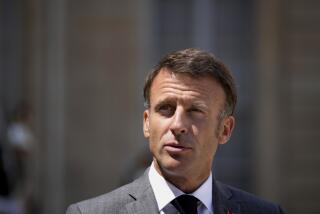Nigeria’s New Leader Frees Journalists, Will Seek IMF Accord on Debts
- Share via
ABIDJAN, Ivory Coast — Nigeria’s new military rulers Wednesday imposed tight security in Lagos, the capital, and fulfilled a promise to release journalists jailed by the ousted Supreme Military Council.
The new leader, Maj. Gen. Ibrahim Babangida, announced that he will break the country’s year-old impasse with the International Monetary Fund over repayment of debts.
There were no reports of violence since Tuesday’s coup, which deposed Maj. Gen. Mohammed Buhari. The coup leaders charged that Buhari failed to end corruption and improve the ailing economy of oil-rich Nigeria.
Nigerian radio on Wednesday quoted a spokesman for Babangida as saying a 7-p.m.-to-6 a.m. curfew imposed in Lagos and state capitals would remain in force until further notice. Airports and seaports remained closed and international communications lines cut.
The press had often been at odds with Buhari, and last month he had threatened to close “erring private newspapers.”
Journalists Freed
Babangida promised to release all jailed journalists and to expedite the prosecution or release of hundreds of people jailed since the coup that brought Buhari to power at the beginning of 1984.
Editors Bukar Zarma of the New Nigerian and Lawrence Olanipe of the Nigerian Tribune were released Wednesday, Nigerian radio said. It also said that the former director of the Nigerian Public Service Commission, Sule Katagum, has been freed.
Babangida, a combat veteran of the Biafra civil war who was trained at British and American military schools, told the nation after Tuesday’s coup that its oil resources are being wasted and that under Buhari’s rule, the country was suffering from the same economic ills that prompted the coup of Dec. 31, 1983.
His speech suggested that the new government is considering a devaluation of the Nigerian naira, a move opposed by the previous regime. Devaluation has been the snag in negotiations with the International Monetary Fund for rescheduling debts and getting new loans from other international agencies.
Babangida promised to make progress in talks with the IMF, and he warned that austerity measures without structural reforms would fail. Presumably, Nigeria--a nation of nearly 90 million, the continent’s most populous--will seek a rescheduling of debts in return for a devaluation.
More to Read
Sign up for Essential California
The most important California stories and recommendations in your inbox every morning.
You may occasionally receive promotional content from the Los Angeles Times.










